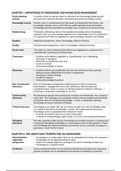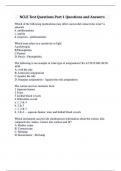Samenvatting
Samenvatting Knowledge in Organisations
- Instelling
- Radboud Universiteit Nijmegen (RU)
Samenvatting van het boek van het vak Knowledge in Organisations (MAN-BCU322A). Het betreft hoofdstuk 1 t/m 16. Boek: Hislop, D., Bosua, R. & Helms, R. (2018). Knowledge management in organizations: a critical introduction (fourth edition; Oxford: Oxford University Press; ISBN 978-0-19--8)
[Meer zien]








